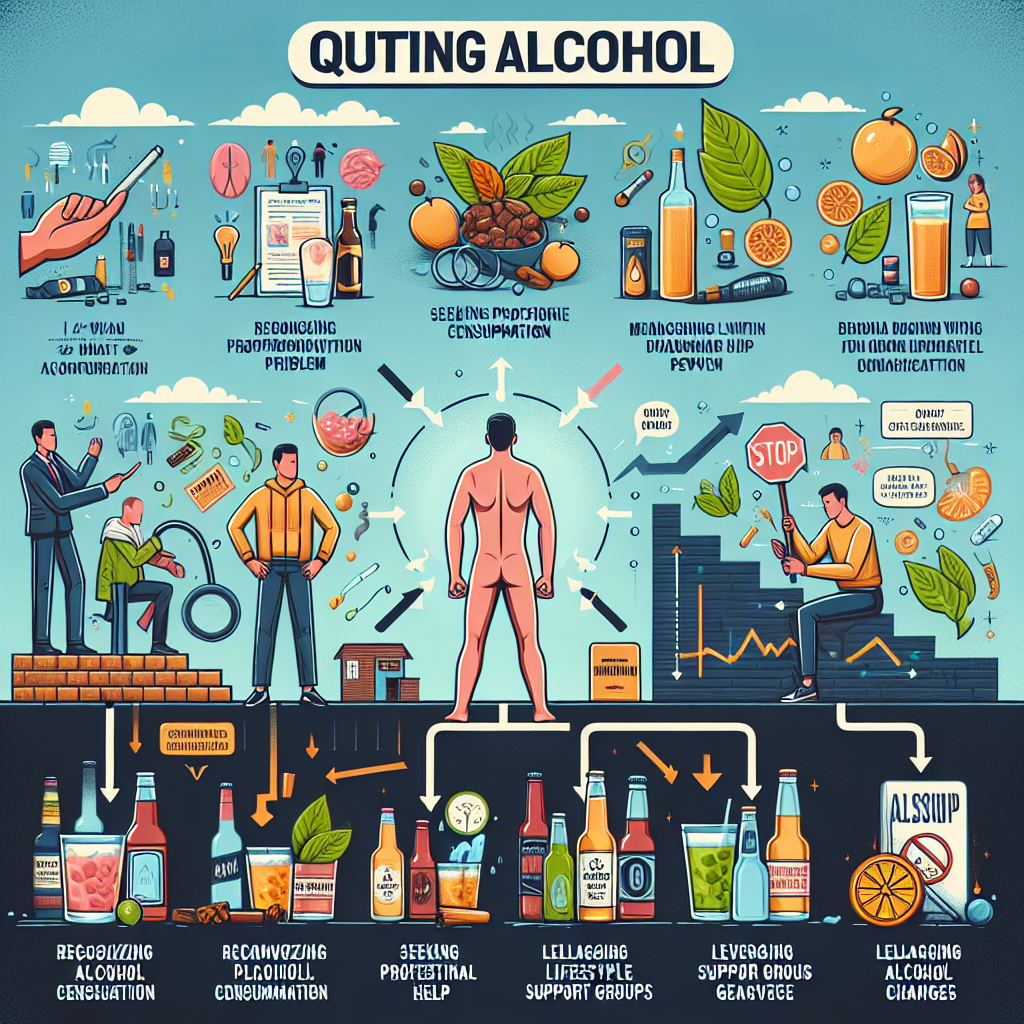-
Table of Contents

“Empower Your Life: Break Free from Alcohol and Embrace Sobriety”
Introduction
Overcoming alcohol cravings and stopping drinking is a challenging but achievable goal that requires a multifaceted approach. It begins with acknowledging the problem and committing to change. Understanding the triggers and underlying causes of alcohol dependence is crucial. Developing a strong support system, whether through friends, family, or support groups, can provide the necessary encouragement and accountability. Implementing healthy lifestyle changes, such as regular exercise, balanced nutrition, and stress management techniques, can help reduce cravings. Professional help, including therapy and medical treatment, may also be necessary to address both the physical and psychological aspects of addiction. By combining these strategies, individuals can take significant steps towards a healthier, alcohol-free life.
Practical Strategies to Stop Drinking and Overcome Alcohol Cravings
Overcoming alcohol cravings and stopping drinking can be a challenging journey, but with the right strategies and mindset, it is entirely possible to achieve lasting sobriety. One of the first steps in this process is to acknowledge the problem and make a firm commitment to change. This commitment serves as the foundation upon which all other strategies are built. Once you have made this decision, it is crucial to set clear, achievable goals. These goals can range from reducing the amount of alcohol you consume to completely abstaining from it. By setting specific, measurable objectives, you create a roadmap that guides your actions and keeps you focused on your ultimate aim.
In addition to setting goals, it is essential to identify your triggers. Triggers are situations, people, or emotions that prompt you to drink. By recognizing these triggers, you can develop strategies to avoid or cope with them. For instance, if stress is a significant trigger for you, finding alternative ways to manage stress, such as through exercise, meditation, or engaging in hobbies, can be incredibly beneficial. Moreover, surrounding yourself with a supportive network of friends and family can provide the encouragement and accountability you need to stay on track. Sharing your goals with trusted individuals can also help you feel less isolated and more motivated to succeed.
Another practical strategy is to gradually reduce your alcohol intake rather than quitting abruptly. This approach can help minimize withdrawal symptoms and make the transition to sobriety more manageable. For example, you might start by cutting back on the number of drinks you have each week or by diluting your drinks with water or a non-alcoholic beverage. Over time, these small changes can add up and make a significant difference in your overall consumption.
Furthermore, finding healthy alternatives to drinking can play a crucial role in overcoming alcohol cravings. Engaging in physical activities, such as running, swimming, or yoga, can release endorphins and improve your mood, making it easier to resist the urge to drink. Additionally, exploring new hobbies or rekindling old ones can provide a sense of fulfillment and purpose, reducing the temptation to turn to alcohol for comfort or entertainment.
It is also important to develop coping mechanisms for dealing with cravings when they arise. One effective technique is to practice mindfulness and stay present in the moment. By focusing on your breath and observing your thoughts without judgment, you can create a sense of calm and reduce the intensity of your cravings. Another strategy is to distract yourself with a different activity, such as reading a book, going for a walk, or calling a friend. By shifting your attention away from the craving, you can weaken its hold on you and regain control over your actions.
Lastly, seeking professional help can be a vital component of your journey to sobriety. Therapists, counselors, and support groups can offer valuable guidance, resources, and emotional support. Cognitive-behavioral therapy (CBT), for example, can help you identify and change negative thought patterns that contribute to your drinking behavior. Support groups, such as Alcoholics Anonymous (AA), provide a sense of community and shared experience, which can be incredibly empowering and motivating.
In conclusion, stopping drinking and overcoming alcohol cravings is a multifaceted process that requires dedication, self-awareness, and the implementation of practical strategies. By setting clear goals, identifying triggers, gradually reducing intake, finding healthy alternatives, developing coping mechanisms, and seeking professional support, you can successfully navigate the path to sobriety and reclaim control over your life. Remember, every step you take towards sobriety is a step towards a healthier, more fulfilling future.
Mindfulness Techniques to Combat Alcohol Cravings and Maintain Sobriety
Mindfulness techniques can be powerful tools in the journey to stop drinking and overcome alcohol cravings. By cultivating a heightened awareness of the present moment, individuals can better understand their triggers and develop healthier coping mechanisms. One of the first steps in utilizing mindfulness to combat alcohol cravings is to recognize and acknowledge the craving without judgment. Instead of viewing the craving as a failure or a sign of weakness, it can be seen as a natural response that can be managed with the right strategies.
Breathing exercises are a fundamental mindfulness technique that can help manage cravings. When a craving arises, taking slow, deep breaths can help calm the mind and body. Focusing on the breath can create a sense of grounding and reduce the intensity of the craving. This simple yet effective practice can be done anywhere and at any time, making it a versatile tool in maintaining sobriety.
Another powerful mindfulness practice is the body scan meditation. This involves paying close attention to different parts of the body, starting from the toes and moving up to the head. By doing this, individuals can become more attuned to physical sensations and emotional states. This heightened awareness can help identify the early signs of a craving, allowing for proactive measures to be taken before the craving becomes overwhelming.
In addition to these techniques, practicing mindful eating can also play a significant role in overcoming alcohol cravings. Often, cravings for alcohol can be linked to hunger or nutritional deficiencies. By eating mindfully, individuals can ensure they are nourishing their bodies adequately, which can reduce the likelihood of cravings. This involves paying attention to the taste, texture, and smell of food, as well as recognizing feelings of hunger and fullness.
Furthermore, engaging in mindful activities such as yoga or tai chi can provide both physical and mental benefits. These practices combine movement with breath awareness, promoting relaxation and reducing stress. Since stress is a common trigger for alcohol cravings, incorporating these activities into a daily routine can be highly beneficial. They not only help in managing cravings but also contribute to overall well-being.
Journaling is another mindfulness technique that can aid in maintaining sobriety. By writing down thoughts and feelings, individuals can gain insight into their emotional states and identify patterns that may lead to cravings. This self-reflection can be empowering, as it provides a clearer understanding of personal triggers and the progress made in the journey to sobriety.
Moreover, practicing gratitude can shift focus from cravings to positive aspects of life. By regularly acknowledging things to be grateful for, individuals can foster a more optimistic outlook. This positive mindset can make it easier to resist cravings and stay committed to sobriety. Gratitude practices can be as simple as writing down three things to be thankful for each day or reflecting on positive experiences before going to bed.
Lastly, seeking support from mindfulness-based groups or therapy can provide additional guidance and encouragement. Being part of a community that understands the challenges of overcoming alcohol cravings can offer a sense of belonging and reduce feelings of isolation. Professional guidance can also introduce new mindfulness techniques and provide personalized strategies for maintaining sobriety.
In conclusion, mindfulness techniques offer a holistic approach to combating alcohol cravings and maintaining sobriety. By incorporating practices such as breathing exercises, body scan meditation, mindful eating, yoga, journaling, and gratitude, individuals can develop a deeper awareness of their triggers and cultivate healthier coping mechanisms. With dedication and support, mindfulness can be a transformative tool in the journey to a sober and fulfilling life.
Q&A
1. **Question:** What are some effective strategies to stop drinking alcohol?
**Answer:** Effective strategies to stop drinking alcohol include seeking professional help such as therapy or counseling, joining support groups like Alcoholics Anonymous, setting clear goals and tracking progress, avoiding triggers and environments that encourage drinking, and finding healthy alternatives to cope with stress and emotions.
2. **Question:** How can one overcome alcohol cravings?
**Answer:** To overcome alcohol cravings, one can practice mindfulness and stress-reduction techniques such as meditation or deep breathing exercises, engage in physical activities or hobbies to distract from cravings, maintain a healthy diet and stay hydrated, seek support from friends, family, or support groups, and consider medications prescribed by a healthcare provider that can help reduce cravings.
Conclusion
To stop drinking and overcome alcohol cravings, it is essential to develop a comprehensive plan that includes seeking professional help, building a strong support system, adopting healthy coping mechanisms, and making lifestyle changes. Professional help can involve therapy, counseling, or joining support groups like Alcoholics Anonymous. A strong support system of friends and family can provide encouragement and accountability. Healthy coping mechanisms such as exercise, hobbies, and mindfulness practices can help manage stress and reduce cravings. Making lifestyle changes, such as avoiding triggers and creating a structured daily routine, can also support long-term sobriety. Consistency, commitment, and patience are key to successfully overcoming alcohol dependence.



